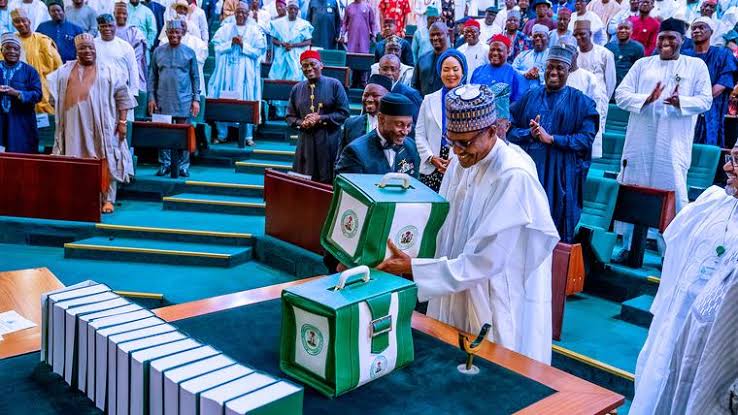
President Muhammadu Buhari unveils record budget plan based on projected price for crude oil of $57 per barrel and output of 2.18 million barrels a day in Africa’s leading producer.
President Muhammadu Buhari presented a record $33.8 billion budget for 2020 to lawmakers on Tuesday as he aims to spur growth in Africa’s largest economy at the start of his second term in office.
Buhari told lawmakers at a joint session of the upper and lower chambers of parliament that the “economic environment remains challenging” but said the budget was expected to increase the pace of growth.
“The 2020 budget is expected to accelerate the pace of our economic recovery, promote economic diversification, enhance competitiveness and ensure social inclusion,” said Buhari, who won an election in February and began his second four-year term in May.
He has repeatedly stated his desire to boost non-oil sources of revenue since crude oil sales make up around 90 percent of foreign exchange. Low prices were the main reason for the economy’s slide into recession in 2016.
The plan for Africa’s top oil exporter assumes crude production of 2.18 million barrels a day and an oil price of $57 per barrel, although an analyst said the budget implementation may “deviate dramatically” from the figures unveiled.
Sluggish growth
Nigeria emerged from its first recession in 25 years in 2017. Growth is still sluggish, although higher oil prices and recent debt sales have helped the country to accrue billions of dollars in foreign reserves.
Economic growth slowed to an annual rate of 1.94 percent in the three months to the end of June, the second quarter in a row of decline.
“We are optimistic about attaining higher and more inclusive GDP growth,” Buhari said.
The spending plan, which includes a value-added tax increase from 5 percent to 7.5 percent, is up from the 8.83 trillion-naira [$24 billion] budget for 2019 and tops the previous record spending plan which was the 9.12 trillion-naira [$25.22 billion] budget for 2018.
Budget deficit
Buhari’s government has repeatedly rolled out record-spending plans but struggled to fund them because of lower oil production and an inability to boost non-oil exports.
Buhari, who in his re-election campaign vowed to implement a road and rail construction programme, said 2.46 trillion naira [$6.8 billion] had been allocated to capital projects and 2.45 trillion naira [$6.5 billion] for servicing debts.
A budget deficit of 2.18 trillion naira [$6 billion] — representing 1.52 percent of the estimated gross domestic product — was to be financed through foreign and domestic borrowing, plus the proceeds of privatisation, he said.
The president said he would seek the support of lawmakers to pass two petroleum bills into law.
You may be interested

2024 CHANQ: History Not Kind To Us Against Ghana –Ogunmodede
Webby - December 24, 2024Home-based Super Eagles coach Daniel Ogunmodede says history has not been good to Nigeria when they face rivals Ghana.The home-based…

Ex-Chelsea Star Oscar Returns To Boyhood Club Sao Paulo
Webby - December 24, 2024Former Chelsea midfielder Oscar is returning to his Brazilian boyhood club Sao Paulo after 14 years, which included a long…

‘I’m Incredibly Proud’– Arokodare Talks Up Genk’s Unbeaten Home Streak
Webby - December 23, 2024Tolu Arokodare is full of excitement followingGenk’s historic victory over Anderlecht, reports Completesports.com.Sunday’s win at the Cegeka Arena was the…


















![American Pastor, David Wilson Seen Eating The Box Of Woman Who Isn’t His Wife [Video]](https://onlinenigeria.com/wp-content/uploads/2019/10/american-pastor-david-wilson-seen-eating-the-box-of-woman-who-isnt-his-wife-video-150x150.jpg)








![Supreme Court Review: BT Updates on Proceedings [VIDEO]](https://onlinenigeria.com/wp-content/uploads/2020/03/supreme-court-review-bt-updates-on-proceedings-video.jpg)
